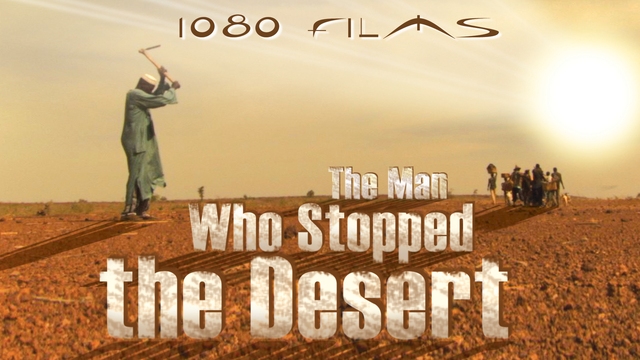In Burkina Faso the rapid desertification of once fertile plains caused droughts and ruined harvests, sparking a mass exodus of inhabitants and famines that decimated populations. Yet one illiterate peasant farmer and his ingenious farming methods have proved the key to achieving what experts have failed to do: stop the desert. This doc tells the unique story of Yacouba Sawadogo, whose years of toil have transformed the lives of thousands.
It was barren landscapes and sandy plains that dominated Yacouba's early years. As a pupil sent away from home to study the Qur'an, he and his classmates were almost starving. The young boys would trek across the wilderness for miles, only to fall and beg at a straw hut for meagre rations.
"Sometimes we managed to beg a lot of things to eat, sometimes we didn't get anything", Yacouba recalls.
It is from this harsh background that the young farmer became determined to develop techniques that would bring exhausted soil back into production. His efforts have outdone the work of the world's leading scientists and technological advances costing millions of pounds. They may also yet prove crucial to the future of the world's rapidly growing population and global food demands.
"Yacouba has single-handedly had more impact on conservation than all the national and international researchers put together", argues Dutch desertification expert, Chris Reij.
"We must not be enemies of nature", warns Yacouba, as he works tirelessly on the sun-scorched land. But Yacouba's hardest battle was not to be with the forces of nature. His new techniques went against the accepted wisdom of the traditional land chiefs and prompted an angry response.
"When you start work that others don't understand then they treat you as a mad man." On his way to meet the local governor to share the results of his work a violent response was waiting.
"I could see the fire from the city, because the forest was very dense and the fields were full of crops." A blaze started by locals had destroyed his entire field of crops. It was a devastating setback, but one that only reinforced Yacouba's determined to overcome the stigma of his work.
As one scientist points out, what makes Yacouba so inspiring is that
"he never stops trying. Every year he is adding to his experience." Bursting grain stores, large cook-pots and plenteous fields reveal the great success of one man's relentless endeavours. But Yacouba's intentions stretch beyond feeding his own family. He speaks passionately of the good his methods have done for the region at large. Those who fled thirty years ago are beginning to return.
"We need to eat well to work well", he insists. Thanks to one man's twenty-year devotion, this can finally be achieved in one of the poorest countries on earth.
LEARN MORE.
WATCH MORE.
JOIN THE DISCUSSION.

Special Jury Award, International Forest Film Festival, 2011

Best Independent Film, International Wildlife Film Festival Montana, 2011

Finalist, Jackson Hole Wildlife Film Festival, 2011
 In Burkina Faso the rapid desertification of once fertile plains caused droughts and ruined harvests, sparking a mass exodus of inhabitants and famines that decimated populations. Yet one illiterate peasant farmer and his ingenious farming methods have proved the key to achieving what experts have failed to do: stop the desert. This doc tells the unique story of Yacouba Sawadogo, whose years of toil have transformed the lives of thousands.
In Burkina Faso the rapid desertification of once fertile plains caused droughts and ruined harvests, sparking a mass exodus of inhabitants and famines that decimated populations. Yet one illiterate peasant farmer and his ingenious farming methods have proved the key to achieving what experts have failed to do: stop the desert. This doc tells the unique story of Yacouba Sawadogo, whose years of toil have transformed the lives of thousands.
 Special Jury Award, International Forest Film Festival, 2011
Special Jury Award, International Forest Film Festival, 2011
 Best Independent Film, International Wildlife Film Festival Montana, 2011
Best Independent Film, International Wildlife Film Festival Montana, 2011
 Finalist, Jackson Hole Wildlife Film Festival, 2011
Finalist, Jackson Hole Wildlife Film Festival, 2011



